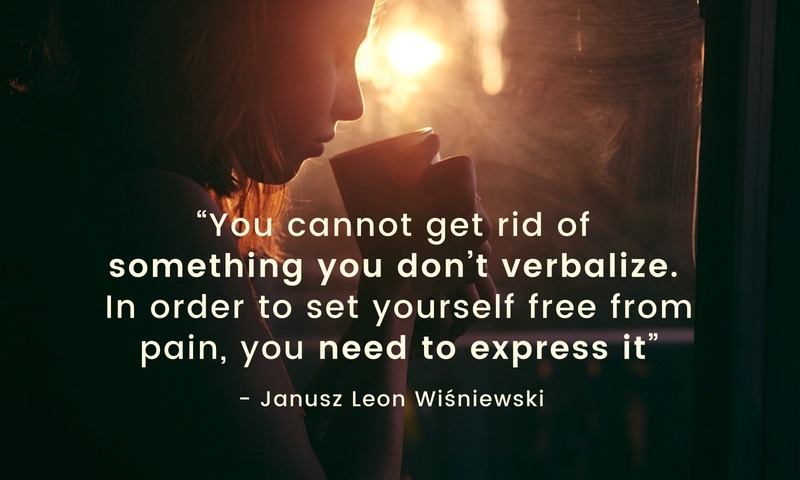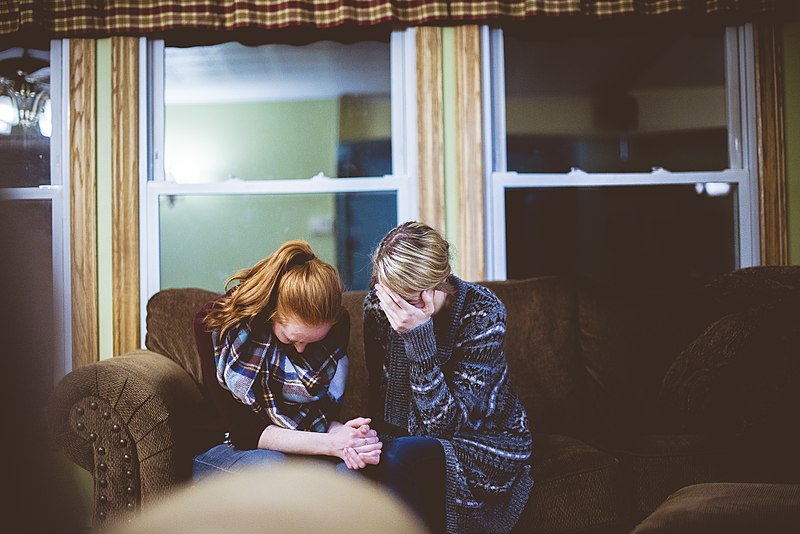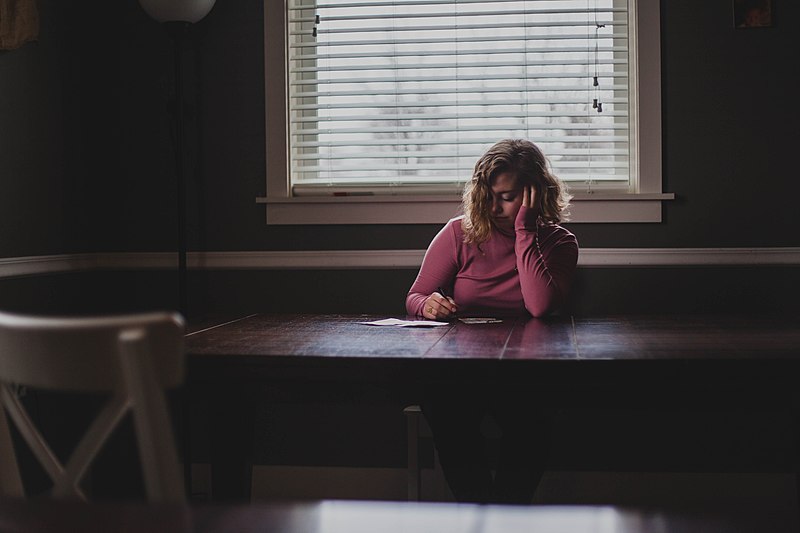3 ways of dealing with emotional pain

Most of us have been wounded at some point in our lives, which may result in a recurring emotional pain. The best ways for releasing it are psychotherapist’s sessions or meeting with a good friend. As this is not always possible, here is an article about ways of dealing with emotional pain on your own.
 Culture of emotional denial
Culture of emotional denial
If I had to choose only one thing that I wish I had been taught in childhood, I would definitely pick the ability to accept and express my emotions.
After years of working in this field, I come to the conclusion that it is the sociocultural trend towards suppressing and denying our feelings that makes the most damage in our psyche. Most of the troublesome parts of our personality are formed as a natural response to the fact that we are unable to deal with our emotions. Some parts of our psyche are forced to keep the denied feelings out of our consciousness (through various distractions, such as pursuit of success, perfectionism, emotional indifference), while others are forced to put out emotional fires when the feelings break the surface (most often, through different addictions).
Some parts of our psyche are forced to keep the denied feelings out of our consciousness (through various distractions, such as pursuit of success, perfectionism, emotional indifference), while others are forced to put out emotional fires when the feelings break the surface (most often, through different addictions).
Therefore, the state of being internally "charged" with repressed, destructive emotions, which want to get to our consciousness at all costs, is very common in our society.
In order to free ourselves from these emotions, we must let them flow. We must express them.
 Healing power of intimacy
Healing power of intimacy
Research clearly shows that people who have close and sincere friendships are happier than those who haven’t formed such relationships in their lives. One of the most important reasons for this increased sense of happiness is that, thanks to our close ones, we find it much easier to deal with emotional pain.
Friendships can heal like a good therapy. How is this possible? Well, in order to shake off heavy emotional baggage it is sometimes (but not always) enough to go with your close and trustworthy friends through the following three stages:
- Expressing what you find hard to cope with;
- Being listened to attentively;
- Being accepted regardless of what we have expressed.
It can do wonders when all these three elements occur. If we feel accepted and experience intimacy and love regardless of what we struggle with, emotional wounds can heal much faster.
However, it takes courage to confide in your close ones about what you are going through and it is necessary to be able to put total trust in them. You need to be certain that the condition number 2 and 3 are fulfilled. As long as I fear that I will not be listened attentively or that I will not be accepted with what I am experiencing, I am not going to share anything.
 Unfortunately, the relationships where these darker aspects of our personality can be safely revealed in hope of finding empathy and love are not very common. Some of us have close friends who can’t accept themselves, and therefore are unable to show acceptance towards other people and their internal conflicts. Others prove to be bad at listening as they are always in need to be the centre of attention.
Unfortunately, the relationships where these darker aspects of our personality can be safely revealed in hope of finding empathy and love are not very common. Some of us have close friends who can’t accept themselves, and therefore are unable to show acceptance towards other people and their internal conflicts. Others prove to be bad at listening as they are always in need to be the centre of attention.
It is often the case that there are no friends with whom we could be totally open and honest.
And then what? Is seeing a professional therapist the only solution you are left with?
Let’s not kid ourselves, if the pain is unbearable or associated with some trauma, it is necessary to see a specialist.
However, surprisingly often we can find ways to deal with emotional pain on our own.
Below you will find three simple (though not always easy to introduce) and practical ways to deal with emotional pain.
1. Write a letter
You can write a letter addressed to the person who inflicted pain on you, or to yourself, or to the part of yourself that is hurting. Pour out all your feelings and all your thoughts. Don’t restrain yourself. Don’t hold back tears. Curse if you feel that you need to. You don’t have to send this letter or share it with anyone. Think of it as an experiment. Grab a piece of paper and a pen, give yourself some time and just put your feelings down on paper. Sometimes it’s good to consider sending or handing this letter to a person that your pain is related to. There are situations when we feel that the other person should know what suffering he or she has caused us. If we have the courage to share it with someone who has hurt us, it’s good to trust your gut and follow through.
Sometimes it’s good to consider sending or handing this letter to a person that your pain is related to. There are situations when we feel that the other person should know what suffering he or she has caused us. If we have the courage to share it with someone who has hurt us, it’s good to trust your gut and follow through.
If we decide to do so but realize that the original letter sounds too emotional or maybe even vulgar, you can write another one. The original letter will help you let out everything that’s bugging you, look at it from a distance and compose your thoughts, while the next letter will be an opportunity to give the right utter to it so that the other person can really understand what you are going through.
2. Let it out
It is often the case that we put all our energy to suppress the emotions we don’t want to feel. Of course, it is futile as sooner or later the non-verbalized feelings take control over us. Such a strategy takes us nowhere.
Alexander Lowen, an American psychiatrist and psychotherapist, suggests taking on a completely opposite approach. His method is about going all the way into the difficult emotions, engaging your whole body in the process, so that you can let out everything you are experiencing.
 But how to do it exactly?
But how to do it exactly?
Shut yourself in your room and turn on loud music so that none of your family members or neighbours can hear you. Give yourself a moment to feel all the pain that burns you on the inside. Try to experience these emotions as much as possible. And then let yourself flow with them. Cry, scream, punch pillows with your fists. Spit it out.
It’s not about shedding a few tears but about decent thorough weeping or/and shouting with all your strength. Don’t be hasty about it, take as much time as you feel you need to.
Releasing energy from the body in this way is usually enough to lift the weight off your shoulders completely or at least make it significantly lighter.
3. Tend to the wounded part
What we expect so much to get from others, we can quite often give ourselves on our own.
Our personality consists of many parts called subpersonalities. Each part is responsible for specific behaviours, beliefs and feelings. Some parts (such as an inner child) may carry suffering that stems from our childhood (or any other stage of our lives). It turns out that by encountering the wounded part of our personality, we can set it free from the pain.
Each of us can achieve a state of mind in which we don’t identify ourselves with any of our subpersonalities. In IFS (Internal Family Systems) approach to therapy, this state is known as the Self. In this condition, we are full of empathy, openness and curiosity and we can take care of the wounded part by listening to it and showing it support, just like a friend gives support to a friend.
Close your eyes and pause for a moment to compose yourself. Take a few deep breaths and find this peaceful inner space. Then recall your emotional pain and see where in your body you feel those emotions. Once you have established contact with your feelings, focus on the mental image that starts to emerge. Perhaps with your imagination you will view a form, a color, a shape or an object. Don’t make up any pictures in your head by force - just let it come to you spontaneously.
Visualize as you are hugging this part of yourself, giving it your comforting presence, showing it love and affection. Embrace it like this for about 10 minutes. You can also speak to it and ask about what it has gone through. Give it the support it needs. Ask this part if there is anything else you can do. At the end, say goodbye and ensure this part that from now on you will visit it regularly.
If you feel that the pain is too big for you to process it on your own, that’s all right, don’t force yourself into anything. Look for professional help and address the issue together with a psychologist or a psychotherapist.
Let’s say, you have tried the methods described above and none of them worked for you. Then what? It's okay, too, as there's a good chance that, after all, the wound healing process has started and you'll soon feel its effects. It’s good to repeat these exercises every couple of days.
Remember that fear has a quick ear and any confrontation with these darker aspects of your personality, which experience sadness, grief, anger or any other form of suffering, is not going to be that bad. But most importantly, remember that it is possible to break free from this emotional pain.
Write in the comments what you think about these methods and how you feel after doing the exercises.

 Healing power of intimacy
Healing power of intimacy